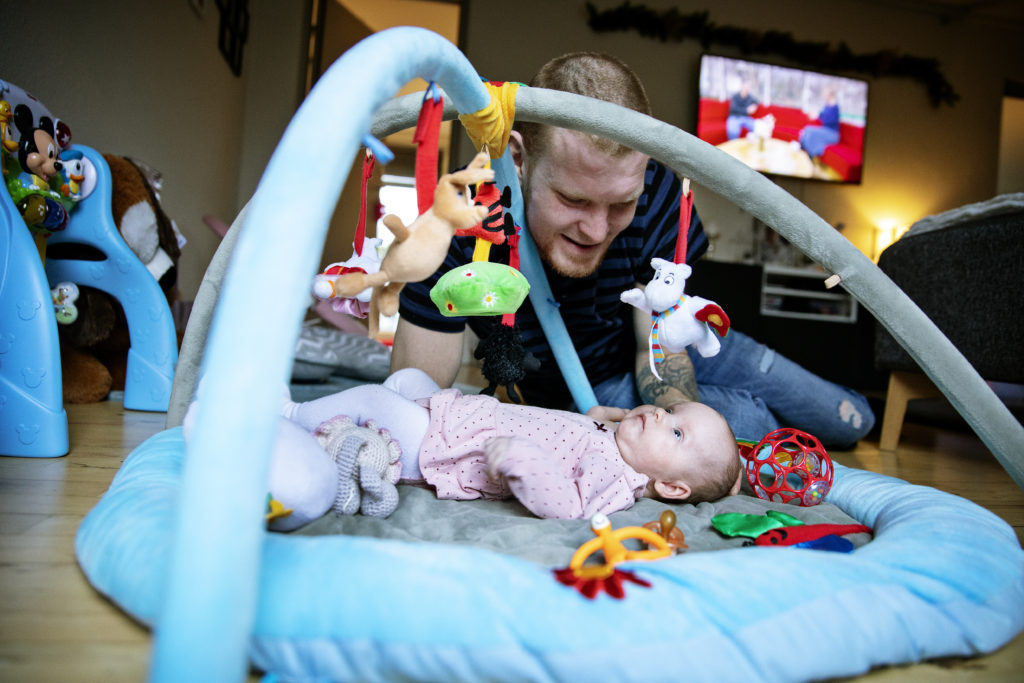Sådan kan du som far gribe fødslen an
Langt de fleste mænd (95 %) er med til deres barns fødsel. Det er oftest en oplevelse fyldt med spænding, forventning og glæde over endelig at få sit barn. Og det er også helt ok, at man kan være nervøs – en fødsel er en stor ting at være med til.
Alle fødsler er forskellige, og derfor findes der heller ikke en komplet guide til, hvad der kommer til at ske. Alligevel er der nogle ting, det kan være godt at vide for dig som far, når du står i fødselssituationen.
Tal tingene igennem inden fødslen
Selve fødslen kommer i høj grad til at foregå på din kærestes præmisser, og derfor kan det være en god idé, at I snakker om, hvad der skal ske, og hvad jeres forventninger er. I nogle situationer vil din kæreste ikke selv være i stand til at svare eller tage stilling til noget, og der er det en fordel, at du kender hendes ønsker og kan svare for hende.
Tal med din kæreste om:
- Hvilken rolle du som far gerne vil have under fødslen?
- Den, der tager imod barnet?
- Den, der klipper navlestrengen?
- Den, der står i hovedenden og holder din kæreste i hånden?
- Hvad der er vigtigt for din kæreste, at du bidrager med?
- Smalltalk?
- Massage?
- Berøring?
- Hvor meget bedøvelse og hjælp fra jordemoderen, din kæreste vil have?
Vær opmærksom på, at en fødsel er uforudsigelig, så uanset hvor meget, I har forberedt jer, kan der ske uventede ting.
Det kan du bidrage med under fødslen
Det vigtigste, du kan bidrage med under en fødsel, er at være der. Mange mænd kan have svært ved at finde deres rolle under fødslen. Man vil så gerne hjælpe sin kæreste, men det kan være svært at få øje på, hvad man konkret kan gøre.
Fra de første veer til fødslen er overstået, er der nogle praktiske ting, du kan gøre for at støtte din kæreste.
Det kan du gøre for at støtte din kæreste:
- Tag tid på veerne. Du kan tage tid på veerne ved at tælle minutterne mellem en ve begynder til den næste ve begynder. Der findes også apps til smartphones, der kan hjælpe med at tage tid.
- Ring til fødeafdelingen. Når tiden mellem veerne er nede på tre til fem minutter, er det tid til at ringe til fødeafdelingen.
- Læg en plan for transporten til hospitalet. Planlæg gerne i god tid, hvordan I kommer frem til hospitalet. Husk også at have styr på, hvor I skal gå hen, når I ankommer til hospitalet.
- Hold din kærestes hånd. I presseperioder under fødslen kan man nemt føle sig tilovers, men her kan du for eksempel holde din kæreste i hånden, rose og opmuntre hende.
- Giv din kæreste massage. Nogle kvinder vil gerne masseres, nusses eller andet under fødslen. Du kan spørge ind til din kærestes behov imellem veerne.
Du kan også spørge jordemoderen om, hvordan du bedst kan hjælpe din kæreste under fødslen.
Husk dig selv under fødslen
En fødsel kan tage lang tid, så husk dig selv i løbet af den tid, det står på. Husk at spise og drikke, når der er pauser – man kan blive både svimmel og utilpas af mangel på mad og væske. Mange mænd kan også have brug for en pause under selve fødslen til at få lidt ro på og trække vejret igen. Afstem pauser med din kæreste og jordemoderen, og sørg for at være i nærheden, når det går løs igen.
Vær også opmærksom på dine egne grænser. Du behøver ikke at se det hele for at have været en god støtte og hjælp ved fødslen.
Var der noget ved fødslen, der går dig på, er der hjælp at få. Mange fødesteder tilbyder samtaler efter fødslen, hvis blot du nævner det for sygeplejerske eller jordemoder. Er I allerede sendt hjem, kan du i mange tilfælde fortsat kontakte fødeafdelingen, og ellers kan du i stedet få hjælp hos egen læge.




